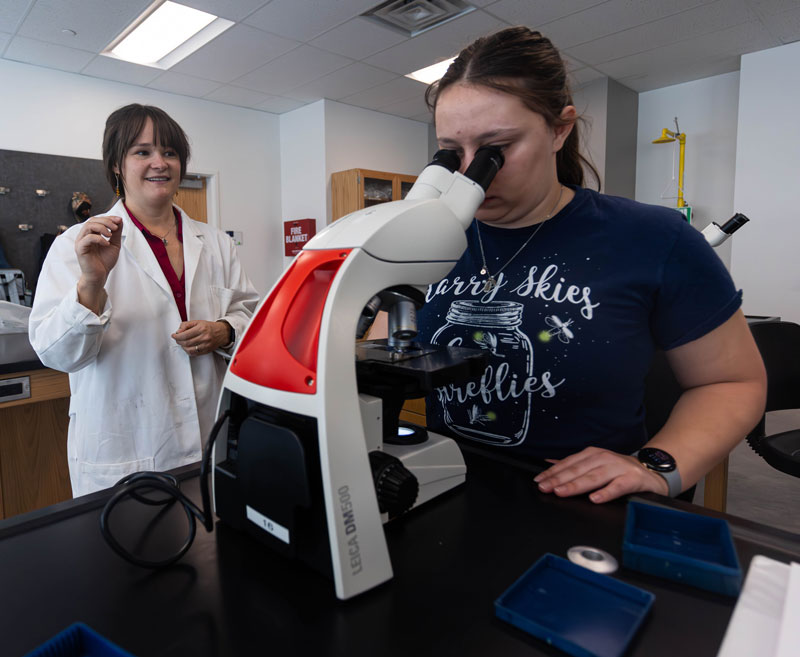OCT
LCCC science faculty seeing success with active learning
 It might be said that Dr. Marie Yearling’s college experience was pretty typical —
sit in the lecture hall of 200 students, read the chapter, take the test. But today,
as a microbiology instructor at Laramie County Community College, she wants to take
a different approach with her students.
It might be said that Dr. Marie Yearling’s college experience was pretty typical —
sit in the lecture hall of 200 students, read the chapter, take the test. But today,
as a microbiology instructor at Laramie County Community College, she wants to take
a different approach with her students.
"For me, it's important to connect Medical Microbiology with students' interests and goals. Then, they’re willing to take that active approach rather than passively sitting back saying, ‘You tell me what I’m supposed to know,’” Yearling said. “It’s about those 'wow' moments that not only stick with them but also inspire them to truly own their learning journey."
Last summer, Yearling was one of more than 30 college educators from the University of Wyoming and five community colleges who participated in the immersive Learning Actively Mentoring Program, or LAMP, Science Initiative Summer Institute. Held at Camp Sacagawea on Casper Mountain in May, educators came together with the goal of mastering active learning techniques with an emphasis on problem-based learning.
Applying active-learning techniques in the classroom wasn’t new to Yearling — she’d been applying those principles in the classroom for six or seven years before her experience at LAMP — but it provided an excellent opportunity to gain new insights and knowledge.
More than just a summer program, the educators in LAMP go through an experience that lasts just more than a year. Around five mentors select applicants for the program, kicking off with an intensive asynchronous curriculum. This allows the educators to think about their fundamental beliefs and values and whether those align with their pedagogies and assessments, said Rachel Watson, LAMP director. A weeklong summer retreat follows. This year, Watson said it focused on problem-based learning, or thinking about how to center curriculum around a real-world problem.
Active learning, Watson said, is more than just having activities in the classroom. It opens up a world of profound opportunities to connect with students.
“It’s really this idea of students engaging, both being hands-on and minds-on in their engagement,” she said.
There are many active learning approaches informed by different teaching and learning traditions. Watson said these modalities are envisioned on a spectrum. The spectrum includes a range of modalities, with things as simple as strategic pauses or hosting small group discussions to allowing students to explore virtual worlds in computer-based realities or role-playing.
“It’s a smorgasbord of techniques that you can adopt that enables that hands-on, minds-on process to happen,” she said. “The techniques all have their flavor with built-in pedagogical practices that promote that minds-on component.”
After years of implementing active-learning techniques in the classroom, and now bolstered by her work at LAMP, Yearling said she sees evidence in her students’ experiences that it’s helping them engage. Students in Yearling’s classes are asked to reflect on what they learned at the completion of projects, which is revealing.
“In their reflections, the students talk about what was difficult and acknowledge that they figured it out,” Yearling said. “I think students are more willing to do that because with active learning we connect what is happening inside the walls of the classroom to what matters outside. Students will write things like, 'I'm taking what I learned and using it to help others' or 'this isn't just knowledge to pass a course. This will help me professionally.’"
LAMP is a part of UW’s Science Initiative, which holds the long-term goal of improving science education and creating world-class research facilities. Bringing in college educators from across the Equality State makes it possible to raise all boats in science education, Watson said.
“We have educators from all these institutions who have become part of a community in an equitable way,” she said.
For more information about LCCC’s science programs, go to lccc.wy.edu/science. Go to uwyo.edu/science-initiative for more information about LAMP and UW’s Science Initiative.
